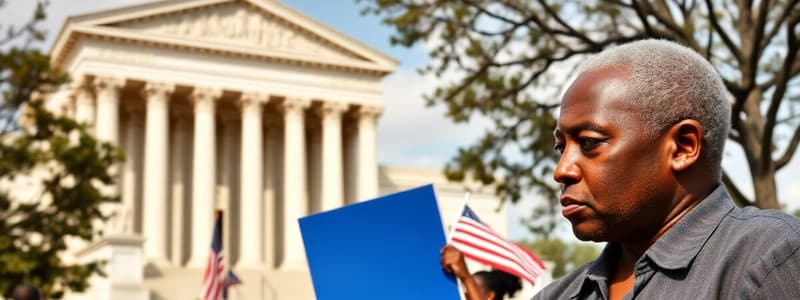Podcast
Questions and Answers
What legal principle was established by the Supreme Court case United States v. Wong Kim Ark?
What legal principle was established by the Supreme Court case United States v. Wong Kim Ark?
Birthright citizenship
What was the main issue that the Supreme Court addressed in Brown v. Board of Education, and what was their ruling?
What was the main issue that the Supreme Court addressed in Brown v. Board of Education, and what was their ruling?
Racial segregation in schools; the court ruled that it was unconstitutional.
In Engel v. Vitale, what specific practice in public schools was deemed unconstitutional, and what was the legal basis for the decision?
In Engel v. Vitale, what specific practice in public schools was deemed unconstitutional, and what was the legal basis for the decision?
Mandatory school-led prayer; the decision was based on the Establishment Clause of the First Amendment.
What was the central issue in the New York Times v. United States case, and what right did the Supreme Court uphold in its decision?
What was the central issue in the New York Times v. United States case, and what right did the Supreme Court uphold in its decision?
What constitutional right was at the center of the Supreme Court's decision in Roe v. Wade concerning abortion access?
What constitutional right was at the center of the Supreme Court's decision in Roe v. Wade concerning abortion access?
Flashcards
Birthright Citizenship
Birthright Citizenship
The Supreme Court ruled that anyone born in the United States, regardless of their parents' nationalities, is a U.S. citizen.
Brown v. Board of Education
Brown v. Board of Education
This landmark case overturned the 'separate but equal' doctrine, declaring that racially segregated schools are unconstitutional and violate the 14th Amendment's Equal Protection Clause.
Engel v. Vitale
Engel v. Vitale
This case ruled that public schools cannot enforce school-led prayers, as it violates the Establishment Clause of the First Amendment, preventing the government from establishing a state religion.
New York Times v. United States (Pentagon Papers Case)
New York Times v. United States (Pentagon Papers Case)
Signup and view all the flashcards
Roe v. Wade
Roe v. Wade
Signup and view all the flashcards
Study Notes
Landmark Supreme Court Cases
-
The Supreme Court, established in 1790, has ruled on tens of thousands of cases, shaping the legal framework and society in the United States.
-
United States v. Wong Kim Ark (1898): Defined birthright citizenship. The Supreme Court ruled 6-2 that anyone born in the U.S. is a citizen, regardless of parent's nationality. This ruling was based on the 14th Amendment. This applied to a person born in San Francisco to Chinese parents.
-
Brown v. Board of Education (1954): Declared racially segregated schools unconstitutional, overturning Plessy v. Ferguson. The unanimous 9-0 decision stated that separate facilities are inherently unequal and violate the 14th Amendment's Equal Protection Clause. This was pivotal in desegregating schools.
-
Engel v. Vitale (1962): Established that public schools cannot mandate school-led prayers. The 6-1 ruling declared a New York State school system's daily prayer unconstitutional, regardless of its voluntary nature. The ruling upheld the Establishment Clause of the First Amendment (prohibiting state establishment of religion).
-
New York Times v. United States (1971) (Pentagon Papers Case): Expanded freedom of the press. The 6-3 ruling acknowledged the right of the New York Times and Washington Post to publish classified information (the Pentagon Papers) detailing US involvement in the Vietnam War. The Court reasoned the government did not sufficiently prove harm to national security.
-
Roe v. Wade (1973): Affirmed a woman's constitutional right to an abortion in the first trimester, based on the right to privacy. The Court allowed state regulation in later trimesters to protect the mother and fetus. It was a landmark case in the abortion rights debate.
-
Texas v. Johnson (1989): Ruled that burning the American flag is protected symbolic speech under the First Amendment. The 5-4 ruling upheld the right of Gregory Johnson to burn the flag.
-
District of Columbia v. Heller (2008): Established an individual right to own firearms, unconnected to military service. The 5-4 decision invalidated a District of Columbia handgun restriction. The Court rejected the idea that the Second Amendment was limited to militia service.
-
Obergefell v. Hodges (2015): Affirmed the right to same-sex marriage nationwide. The 5-4 decision declared unconstitutional state bans on same-sex marriage, based on the 14th Amendment's Due Process and Equal Protection Clauses.
-
Dobbs v. Jackson Women's Health Organization (2022): Overturned Roe v. Wade, eliminating the constitutional right to an abortion. The 5-4 ruling upheld a Mississippi law banning abortion after 15 weeks. The decision returned abortion regulation to individual states. The Court rejected a stare decisis argument for maintaining Roe v. Wade.
Studying That Suits You
Use AI to generate personalized quizzes and flashcards to suit your learning preferences.




